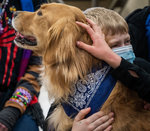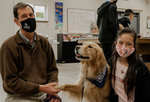


Nearly 20 years after suffering a debilitating stroke, Scott Vande Zande of Longbranch devotes his time to sharing his golden retriever Ginger, a Pet Partners therapy dog, with others. Each week they visit Swedish Hospital’s Cherry Hill campus in Seattle and the Red Barn Youth Center’s after-school program.
“She makes me happy each time she visits,” sixth grader Kodie Henneman said. “She’s really cute and amazing and awesome.”
Pet Partners teams like Vande Zande and Ginger visit patients in recovery, seniors living with Alzheimer’s, veterans with PTSD and others who benefit from animal-assisted therapy, activities and education.
Vande Zande has always loved dogs; growing up in Wisconsin he had a poodle. His past and present golden retrievers, Hollie, Katie and Ginger, all Pet Partners certified therapy dogs, have played important roles in his recovery while also helping others.
“I think the stroke has changed my thought on dogs, just watching them work, just watching what they do and how they can affect people,” he said.
In November 2003, Vande Zande had surgery for an aneurysm at Swedish Cherry Hill. Two hours later, plaque traveled into his brain and he suffered a left-brain stroke resulting in memory loss, limited right-side mobility and aphasia, a condition that affects the ability to speak, write and understand both verbal and written language.
“All I said was ‘yes, yes, yes’ for days,” Vande Zande said.
Shortly after returning home, a golden retriever puppy, Hollie, joined the family.
“Hollie was right there beside me all the time,” he said. “It was just so special. I share that with other people that had strokes.”
Vande Zande has a master’s degree in engineering from the University of Wisconsin and was the production and engineering manager for Boeing’s Fabrication Division at the time of his stroke.
“I was an engineering manager with 350 people reporting to me and I couldn’t say a word,” Vande Zande said. “I just wanted to get back to work and find a way to improve.”
Aphasia impairs the ability to process language but does not affect intelligence. Stroke survivors are mentally alert but their ability to communicate may be disrupted.
Vande Zande’s wife, Jan, took him for walks and asked, “Is that a mailbox? Is that a chimney? Or is that something else?” Having to answer these questions helped his recovery.
About two months after his stroke, Vande Zande returned to Boeing and was able to transfer to a job site with fewer people. “Boeing was super,” he said. “I had two great friends who were my managers and they understood it and they helped.”
When he first returned to work, Vande Zande would misread emails. “I’m sure I frustrated people in my group,” he said. “I felt very helpless.”
“I had to go give talks at work. I wrote down what I wanted to say and I’d start going through it. I went through it so many times. I’d come to a place I wanted to change the word and I couldn’t think of the word, couldn’t think of the word, couldn’t think of the word,” he said. “I did that over and over and over again and sooner or later I was able to think of the word.”
Vande Zande said once he goes through that process of struggling and recalling the word, he remembers it going forward. It once took him three days to recall the word “lazaret,” a space in a sailboat used for storage.
Vande Zande stayed at Boeing 12 more years, then retired in 2015.
“When I retired from Boeing, Hollie came to Cherry Hill with me to meet stroke survivors,” he said. Therapy dogs can help relieve stress, improve mood, and provide comfort and distraction for patients and staff. “This was a very special time for us. We were helping other people.”
Vande Zande and Hollie also visited Mary Bridge Children’s Hospital. Then at age 10, Hollie broke her leg and sarcoma was discovered. In November 2017, about a year after they had started visiting stroke survivors together, Hollie passed away.
“Hollie was so special. She always amazed me,” Vande Zande said.
In 2017, Hollie was honored by the American Heart Association as a Stroke Hero, one of only five winners in the western United States that year. Vande Zande said when Hollie won, it was the best day he can remember.
After losing Hollie, Vande Zande began taking Katie to visit stroke survivors. They joined the Swedish Patient and Family Advisory Team and began doing American Heart Association Stroke Walks together.
Eighty guests attended Katie’s retirement party at Swedish Cherry Hill, including the CEO and Chief Nursing Officer, as well as Ginger.
“(Katie) was exceptional, she really was.” Vande Zande said. He has had to put down four dogs and he cries every time. “I miss all of them but I miss Katie a lot.”
Ginger, who just turned 5, loves running and catching balls at the park, going out in Vande Zande’s 1964 Clipper Craft boat “Golden Girl” and taking nightly walks at the Longbranch Marina. She visits Swedish with Vande Zande every week.
“Everybody knows Ginger,” he said. “They see her coming and immediately everyone comes and pets her and they say ‘thank you.’ ”
A chaplain at the hospital invited Ginger to visit a patient on comfort care who had asked to see her. “She’d trained many service dogs and they had all the pictures,” Vande Zande said. “We put Ginger on the bed and I’m not even sure if she was awake but I think she knew Ginger was there.
“It’s a special deal with me and (Ginger) and my dogs,” Vande Zande said. “I think they know it’s their job, I really believe it.”
Twenty years after his stroke, Vande Zande enjoys photography, welding and glass blowing. He sometimes still struggles with spelling, reading the news, and fastening buttons with his right hand.
“If you look at my texting or emails, they’re pretty bad. But you know what, I’m OK with it,” he said. “I’m not going to complain about that.”
UNDERWRITTEN BY THE FUND FOR NONPROFIT NEWS (NEWSMATCH) AT THE MIAMI FOUNDATION, THE ANGEL GUILD, ADVERTISERS, DONORS AND PEOPLE WHO SUPPORT INDEPENDENT, NONPROFIT LOCAL NEWS